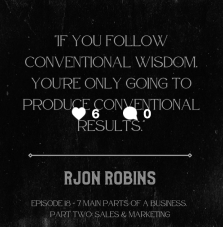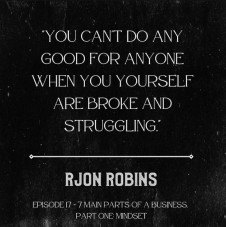RJon Robins
The Causes Of A Law Firm’s Success or Failure NEWSFLASH: Your law firm either runs reliably, efficiently, and profitably, or it runs BADLY. It’s time to act like a grown-up business owner and accept the fact that whether your law firm runs well or poorly, YOU. ARE. THE. CAUSE. Not that it’s your fault; you don’t know what you don’t know, and nobody ever taught you this. But the fact is that there are some surprisingly-simple, practical, non-negotiable, real-world mechanics which are required to make a law firm run well. If you have ever heard me speak at a live event you have probably heard me say that a law firm is a relatively simple business to operate. Compared to just about any of the other kinds of businesses you probably patronize every month, a law firm has fewer moving parts, fewer opportunities to make catastrophic mistakes, lower capital requirements and much better margins. In other words, if your plumber, the owner of your favorite eatery, the florist and whoever owns your favorite clothing store…if they can figure out how to run their business and earn a great living at it, then you can certainly learn how to manage a small law firm that will serve your financial, your personal and your professional needs. It’s just not that complicated. But not all of those business owners run their businesses well. And not all of them are successful. The difference is, the owners of the successful businesses in each of those categories either went to business school, or else they invested in some alternate sort of education other-than the school of hard knocks. Because the school of hard knocks is terribly inefficient and has many hidden costs the student doesn’t often discover until it’s too late. That’s why those of us who have graduated from the school of hard knocks will tell you that anyone who knowingly enrolls in our alma-mater when there are easier, less painful, more profitable, and quicker ways to learn how to do whatever it is that they need to learn how to do…well, I don’t know how else to say it, those people are idiots. Wouldn’t you agree? If you were standing in front of me right now I know you’d be nodding your head in agreement. Or would you advise one of your own kids to skip school and just get a job because eventually they’ll figure it all out on their own? Of course you would never give anyone that advice. Because you’re NOT an idiot. Then why haven’t you dropped-out of the school of hard knocks sooner? Probably it’s because you’re scared that you can’t learn this stuff any other way. You’re worried that you don’t have enough time. And you’ve heard too many arguments, excuses and justifications made by other lawyers whose fears, insecurities and/or lack of self-confidence prevented them from ever learning how to manage a small law firm. So now they have a vested interest in convincing others that it’s impossible. And now as perversely irresponsible as it may seem, they’re actually going around advocating for the school of hard knocks. But it IS possible to learn how to manage a small law firm and become the cause of a successful law firm that generates as much profit as you’re ready to commit to building for yourself and your family. Not only is it possible, it’s actually quite straight-forward. In fact just about any lawyer with an open mind can master the skills needed to create a $250,000 law firm in just about 18 months or less. Or even upgrade to a $500,000 law firm business if that’s what you want. You might even choose to build your business up and break the 7-figure barrier. There are simply too many examples of lawyers who DID learn how to manage a small law firm and now they’re enjoying great success at it. As I wrote before, there are relatively-few moving parts involved in making a law firm run well. It’s all about creating processes, systems, policies, procedures, and metrics: 1.) There are processes, systems, policies, procedures & metrics for getting prospective new clients to the door. 2.) There are processes, systems, policies, procedures & metrics for moving prospective new clients through the front door & over the threshold at which point they can become profitable clients of the firm. 3.) There are processes, systems, policies, procedures & metrics, for delivering value to clients. This is the “factory” we talk a lot about when a lawyer is ready to upgrade from having a practice to building a sustainable law firm business Usually that conversation begins to happen around the $250,000 milestone. 4.) There are processes, systems, policies, procedures & metrics for controlling the finances of the firm and ensuring the firm gets paid for delivering value to its clients. By the way, this idea that they’re clients of the “firm” vs. clients of the lawyer, is another key distinction between lawyers who create a practice -vs.- those who upgrade to the mindset and activities of building a business. This also happens around $250,000. 5.) There are processes, systems, policies, procedures, metrics and inventories used for managing the physical plant which includes where the value gets created, with what equipment and by which human resources of the firm. Any educated lawyer can learn how to manage a small law firm and take control of these five areas of the law firm to create a $250,000 law practice; upgrade to a $500,000 law firm business; break the 7 figure barrier and even join the million dollar solo lawyers’ club if you’re that ambitious. But you’re going to have to learn how. And it starts with having a thought-out, written, actionable, BUSINESS PLAN. There’s simply no way around it- you MUST have a business plan if you are running a law firm. A written business plan lays out the 7 Main Parts of your law firm, and the processes, systems, policies, procedures, and metrics needed to make sure each part is running as efficiently as possible. The truth is, that a lack of a business plan may be the one thing holding you back from the life, business, and career you’ve always envisioned for yourself. Click here to sign up for the Law Firm Business Plan Bootcamp today, and start running your law firm like a successful small business that meets your needs and the needs of your family.
There’s no reason to delay the life you want to live.
Find out how we can help you double your revenue in less than 18 months. Click here to schedule a complimentary discovery call with our team.









